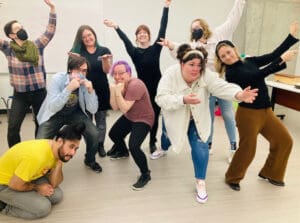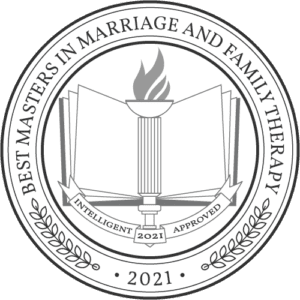Master of Arts
MA in CFT with Drama Therapy
Foster change through movement, story, and role play.
Successful therapy of any kind requires a strong working relationship between client and therapist, based on trust and emotional honesty. In drama therapy, through the client and therapist’s creation of movements, pretend images, stories, and scenes, the therapeutic relationship develops at an accelerated rate. By mutual agreement, client and therapist enter a shared imaginal realm and experience pretend consequences of choices they make within the fictional contexts they create together.
This degree is offered by Antioch University’s Seattle Campus.
Program Overview
Drama therapy is one of several creative arts therapies used by clinicians and practitioners to help their clients achieve emotional and physical integration, personal growth, and symptom relief. Like art therapy, it is the application of a creative modality to psychotherapy. Drama therapy allows you to develop your own way of working with clients using embodiment and theater processes. The Antioch program is broad-based, providing students with experience with Improvisation, Psychodrama, Playback Theater, Narradrama, Developmental Transformations, Healing the Wounds of History, Masks, Puppets, Sociodrama, Theater of the Oppressed, Storytelling, and The Story Within. Students are also exposed to other creative arts therapies incorporating art, movement/dance, music, poetry, film, and geek therapies. Drama therapists work in numerous settings, including, but not limited to, hospitals, residential treatment programs, schools, shelters, community centers, prisons, and private practice. Antioch drama therapy students are highly sought after for internships and often receive offers to continue working after internship. The master’s degree can be completed in three years. The Antioch program is unique in that it offers students training in drama therapy together with training in either Clinical Mental Health Counseling or Couple and Family Therapy. Students choose from Couple and Family Therapy and Clinical Mental Health Counseling coursework, integrating drama therapy as part of additional concentration-specific training, which includes internship. This allows students to seek licensing in Washington or other locations after graduation. Students also can use their drama therapy education to become registered drama therapists with the North American Drama Therapy Association.
Licensure Information
This program is designed to lead to state licensure.
Additional Licensure Information
DT/CFT Degree Requirements
Antioch’s Drama Therapy specialization is combined with the MA in Couples and Family Therapy (CFT) concentration. You should consult with your adviser to create your own sequence of courses before the middle of the second quarter. The Drama Therapy program is 90 quarter credits. Many students in the program find that the program is flexible enough to accommodate working adults. You may begin the program in the fall or spring quarters.
DT/CMHC Degree Information
Antioch’s Drama Therapy specialization combines the MA in Counseling with Clinical Mental Health Counseling (CMHC) concentration. You should consult with your adviser to create your own sequence of courses before the middle of the second quarter.
Drama Therapy Faculty
Antioch’s Drama Therapy program is taught by Faculty who are passionate about and represent the full spectrum of drama therapy.
Meet Our Drama Therapy Faculty
Guest Faculty: From time to time, Antioch brings in additional drama therapists and creative arts therapists as guests in our drama therapy classes and Creative Arts Therapy Student Association events. Some of these guests have included guests with expertise in the following: Art Therapy, Dance/Movement Therapy, Developmental Transformations, Geek Therapy, Healing the Wounds of History, Music Therapy, Sandtray, Somatics and Drama Therapy, and Play Therapy.
Masters Projects
Drama therapy students in their final year of study complete a Masters’s Project, which is a culminating project that contributes to the body of knowledge for the field of drama therapy and Antioch University. The project integrates the student’s academic coursework and clinical experience/interests. The project may be performance-based but is expected to include no less academic rigor. Samples of Recent Drama Therapy Master’s Projects
Emily Bates- Fall, 2022
Masters Project Presentation 10 September/2 pm/AUS/On the Roof Division of work during three-quarters First Quarter: Brainstorming and collaboration. Lit review due at the end of the quarter. Second Quarter: Continued collaboration and self-reflection, gathering stories. Outline of performance due by end of the quarter. Third Quarter: Rehearsal and practice of final performance. Final self-revelatory performance and final paper (Lit Review and reflection of performance) due at end of the quarter. “I started by thinking deeply about all of my classes, colleagues, instructors, and conversions over the past four years and reflected on what was “buzzy” for me. Family, self-discovery, authenticity, community, and making meaning are at the center of why I began the unique process of becoming a Couple and Family Therapist and Drama Therapist. Renne Emunah describes the “riveting authenticity and immediacy” at the core of the drama therapy intervention known as Self-Revelatory performance. I felt called to use the embodiment of my clients, mentors, and friends, as well as storytelling, to create a final performance exploring the magical combination of two life events happening at once: becoming a mother and becoming a Child and Family Therapist in community mental health. The final piece will consist of three themes, and each of these themes will be represented by an embodiment, a story, and a drama therapy activity that involves the audience. Through collaboration with Bobbi Kidder, I have nurtured my curiosity and deepened my understanding of myself and how I present as a clinician. Remember to lean into playfulness, but also relax into what you already know.”
July Huss – Summer, 2022
“I conducted an 8-week case study using the Role Theory Card Sort instrument, Psychodrama, and SoulCollage elements to help the client expand their understanding of their identity and analyze the effectiveness of such instruments and additional assessments in support of the client’s greater therapeutic goals. I used the Internalized Oppression Framework in analyzing the client’s intersectional identity and role selection and offered multiple role decks to select from in the instrument (Standard, Disability, and LGBTQIA+) to achieve the greatest amount of information possible. I then wrote and constructed my case study for presentation and submission to the NADTA journal and beyond! The process was all consuming, but exciting and rewarding. The people behind the research and textbooks we have been reading for 3+ years were once students like ourselves, and we are capable of becoming those people with a dose of curiosity and dedication to contributing to our communities collective knowledge. Start early if you can if you choose to pursue research and don’t forget that this project/thesis/study is just a bit bigger than your previous culminating assignments with the added benefit of being designed to your interests!”
McCall Evans – Spring, 2022
“For my MA Project for the completion of my credits for my Master’s Degree in Clinical Mental Health Counseling with Drama Therapy at Antioch University: Seattle, I chose to write a MA Thesis and Proposal for an addition of the (dis)ability community within the original Role Taxonomy (1991) created by drama therapist Dr. Robert Landy, PhD, RDT-BCT, LCAT. I was inspired by not only my original interest in this specific modality of the therapeutic use of Role Theory but by Role Paradox in Existential Psychological theory and by the expansion of specific populations (ex. LGBTQ+ community and people of color) within the Role Taxonomy being created by drama therapists such as Adam D-F. Stevens, MA, RDT. It is through my extensive work within the specific population of (dis)ability that I saw a need to expand roles that are often ascribed and punitive in nature. I conducted a phenomenological study with 53 participants and created a (Dis)ability Role Taxonomy comprising 35 new roles based on questions regarding role(s) specific to that of the (dis)ability community. It is my hope that this addition to current research and literature will help not only the clients whom I serve but also highlight the need for discussion of inclusion of various specific populations that are served in the clinical mental health field! In giving advice to future students who will be completing the project, I would suggest that you begin to think of what theory or modality of drama therapy that you find most interesting and begin to build up resources, take notes, write down questions, and let them percolate early in your graduate level journey. A helpful hint is to look at what research is “missing.” What do you want to know that has been researched but could be updated or modified? Better yet, what don’t you/we know as drama therapists? Come back to this as you are in your Pre-Internship Practicum (PIP) and as you take your Drama Therapy Research class and make it applicable, experiment, and make mistakes! During the three quarters of working on your project, I suggest that you make your due dates ahead of when you need them to be completed to give yourself space while also navigating the internship. If overwhelmed, take a break, and come back to it later with fresh eyes; it never made anything worse for me. It is also important to remember to have fun; one of the best parts of this project was that even though it was time-consuming and it was a topic that I am invested in, I came away with something which I can actually use as a drama therapist and which I can always expand upon later.”
Jill Pruss/ Madeline Schmidt – Fall, 2021
“Madeline Schmitt and I had been running a Harry Potter-based role-playing game called Muggles & Magic (M&M) for about a year when we decided we wanted to base our MA project on it. We created an experiment to investigate the impact if any, M&M had on youth and building social skills. We ran our experiment at Aspiring Youth, where we worked, and discovered that, according to parent/guardian reports, M&M had statistical significance in increasing their child’s social skills. Interestingly, according to the youth, their social skills declined but not in a statistically significant way. I’d like to share a few nuggets of wisdom that may help you on your master’s project journey: If you want to run an experiment and need IRB approval, give yourself plenty of time. Print out the IRB packet as soon as possible and start filling in everything you know. Then figure out what parts are going to require more research and what parts are going to require approval from other parties, such as the site where you’re doing the experiment. This process took, from start to finish, a couple of months for us. There was a lot of back-and-forth that needed to be done, and each back-and-forth sometimes took a week’s worth of emailing. I cannot stress this enough: Give yourself a lot of time if you’re going to do the IRB process. That being said, not every master’s project needs to be an elaborate experimental design with outstanding results. Sometimes even the hypotheses that seem most simple are, in fact, the most interesting and can also require a lot of work. Hopefully, there will be plenty of time in your future to get into the weeds about different topics that you’re interested in. If you’re getting bogged down and your able to, take some time away and book an Airbnb somewhere to give yourself a new environment and space all to yourself. When my perfectionism reared its head, I had to remind myself that my work and effort was not just good, it was good enough.”
Workshop and Performance Opportunities
 Students in Antioch’s drama therapy program have a number of continuing opportunities to participate in workshops, conference presentations, and performance-based presentations. Drama Therapy and Creative Arts Workshops Students in Antioch’s program come together periodically to play and experience drama therapy together. This includes workshops that feature certain forms of drama therapy and creative arts therapies. Some of the workshops envisioned for the future include:
Students in Antioch’s drama therapy program have a number of continuing opportunities to participate in workshops, conference presentations, and performance-based presentations. Drama Therapy and Creative Arts Workshops Students in Antioch’s program come together periodically to play and experience drama therapy together. This includes workshops that feature certain forms of drama therapy and creative arts therapies. Some of the workshops envisioned for the future include:
- Self-Revelatory Performance
- Poetic Medicine
- Dance/Movement Therapy
- Developmental Transformations
- Conference Opportunities
Students in Antioch’s drama therapy program have the opportunity to submit presentation topics to the North American Drama Therapy Association and other venues. In Fall 2022, students joined Bobbi Kidder and Maggie Yowell Wilson to present a workshop using Joanna Macy’s Council of All Beings at the annual North American Drama Therapy Conference. The workshop also featured a dramatic retelling of “The Last Free Bird” by A. Harris Stone. Performance-Based Presentations From time to time, students from the Antioch drama therapy program, together with Antioch drama therapy alumni, have created and performed in a performance-based presentation.
- The Seed is the Thing 2013
- Decades
- The Seed is the Thing 2023
Playback Theater Troupe Students in Antioch’s Drama Therapy program have the opportunity to gain additional experience in Playback Theater by participating in Antioch’s own Playback Theater Troupe. This troupe meets regularly to learn and rehearse Playback Theater forms and performs as a part of Antioch’s performance offerings.
Cost
| Drama Therapy (MA, Counseling: Clinical Mental Health Counseling, or Couple & Family Therapy) | Cost |
|---|---|
| Cost per Credit | $868 |
| Full-Time Credits per Quarter | 6 |
| Total Program Credits | 90 |
| View the Cost of Attendance Components | |
Financial Aid
Financial Aid is also available to most students. LEARN MORE ABOUT FINACIAL AID
Upcoming Events
Recent News
-
Examining the Relationship Between Non-Suicidal Self-Injury and Attachment Styles | Dissertation Watch
on February 24, 2025
-
An Investigation of Emerging Adults’ Lived Experiences of Relationship Information on Social Media | Dissertation Watch
on February 19, 2025
-
Michelle M. Ehle Featured in Seattle Times for Election Stress Support
on February 12, 2025


